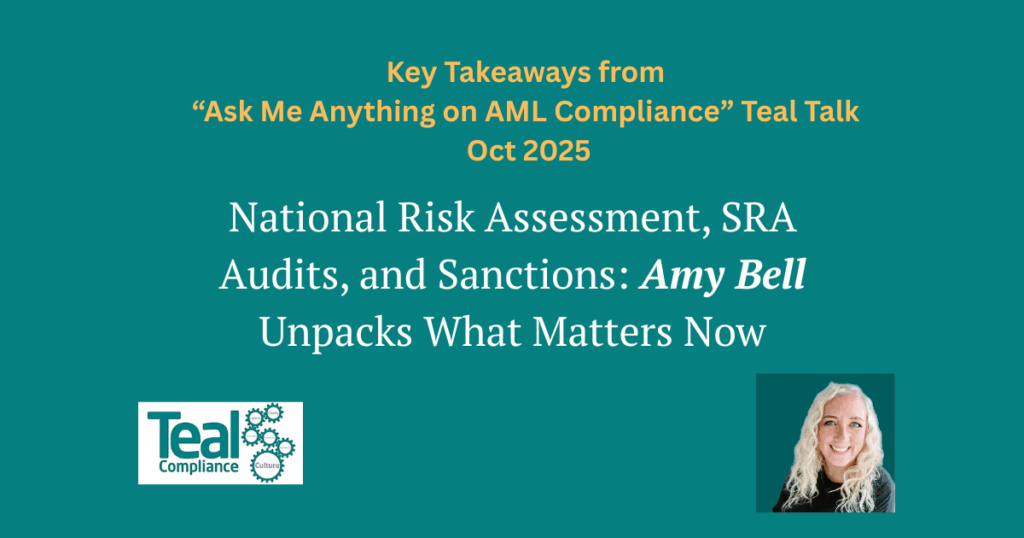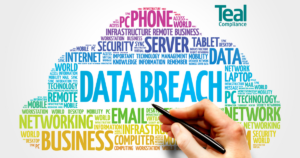Amy Bell’s Ask Me Anything AML sessions are always a hit with compliance officers and MLROs who want the inside track on what is changing in anti-money laundering. Her latest session was no exception, filled with humour, honesty, and plenty of practical advice for law firms navigating the latest developments in AML compliance.
Over the hour, Amy unpacked updates from the National Risk Assessment, the Money Laundering Regulations consultation, and the SRA’s expectations around audits, with real-world examples and her trademark clarity.
Here are the key takeaways from the October discussion.
The National Risk Assessment: Property Risks Still Front and Centre
The July 2025 National Risk Assessment (NRA) confirmed that property remains one of the highest-risk sectors for money laundering, with billions estimated to move through UK property every year.
Amy explained that both luxury and modest properties are abused, as criminals use them to either store or legitimise funds.
"Criminals love property because it is an appreciating asset and it looks legitimate on paper."
Amy Bell
She also welcomed the new structure of the NRA, which looks at how money flows across multiple sectors rather than treating each one in isolation.
“It is not about individual sectors anymore, it is about how money moves through them all. That is how laundering really happens.”
Amy Bell
👉 If you are reviewing your firm’s AML controls, our blog on How to Review Your AML Risk Assessment is a helpful place to start.
Regulation 21 Audits: What the SRA Now Expects
Amy reminded firms that Regulation 21 audits are a legal requirement for firms where the “size and nature” of the business triggers it, such as those with multiple offices, conveyancing departments, or company and trust work.
“If you have more than one office or do conveyancing, you are in scope,” she said. “If you have not had an audit yet, the SRA will expect one soon.”
Amy Bell
She cautioned against relying on audits that double as marketing tools.
“Some regulators are starting to reject audits that are basically sales pitches. If it is not independent, it will not cut it.”
Amy Bell
👉 For guidance, see our post on How to Prepare for an SRA AML Audit.
Client Account and Source of Funds Checks
The SRA is increasingly focused on client account hygiene, particularly where qualified accountants’ reports suggest poor controls. Weak client due diligence and limited evidence of source of funds continue to be common failings.
Amy warned that firms must not rely on automated verification alone.
“If there is a note, inconsistency, or red flag, you have to read it. A tick is not enough.”
She also discussed the current consultation on pooled client accounts, suggesting that banks may soon expect more access to firms’ client due diligence records.
👉 For tips on improving your approach, read our blog on Verifying Source of Funds and Source of Wealth.
The Professional Enabler Definition Narrowed
A welcome change in the new NRA is a tighter definition of “professional enablers.” The term now applies only to those acting deliberately, recklessly, improperly, dishonestly, or negligently.
“If you have acted reasonably and met your obligations, you should not be branded a professional enabler,” Amy said.
This shift reduces the risk of cautious practitioners being unfairly caught up in the label, which Amy called “a long overdue adjustment.”
Sanctions and Counterparty Checks
Sanctions compliance remains a strict liability regime, which means intent is irrelevant.
Amy advised firms to be extra vigilant when funds are sent to third parties.
“If you are sending money anywhere, client or not, you need to be confident it is not reaching a sanctioned person,” she said.
Although some of the SRA’s guidance goes beyond the legislation, Amy encouraged firms to err on the side of caution.
👉 For more insights, visit our Sanctions Compliance Guide for Law Firms.
Third-Party Payments: The Hidden Weak Spot
Amy highlighted that third-party payments remain one of the most commonly exploited weaknesses in law firms. This includes family members or funders paying legal fees.
“Treat third-party money the same as client money. If you check one, check the other,” she advised.
While the legislation does not explicitly require due diligence on third parties, Amy explained that the risk of becoming “concerned in an arrangement” under the Proceeds of Crime Act is very real.
Staff Screening: More Than Just DBS Checks
Under Regulation 21, firms must screen staff for integrity and competence. Amy stressed that DBS checks are only part of the picture.
“A DBS check tells you if someone has been caught before. It does not tell you if they are under pressure now or might be vulnerable to compromise,” she said.
She recommended that firms review how they monitor ongoing risks among staff, not just at the point of hiring.
👉 For practical ideas, read Building a Culture of Compliance.
The Money Laundering Regulations Consultation: What Might Change Next
The government’s short consultation in September proposed several modest but significant amendments to the Money Laundering Regulations.
Proposals include:
- Restricting enhanced due diligence to FATF blacklisted countries only.
- Clarifying that “unusually complex or large” transactions depend on what is typical for the sector.
- Updating trust registration rules to remove low-risk categories and add others.
Amy described the consultation as “short and sharp,” adding,
“It is probably already drafted, so expect the changes to come quickly.”
AML Compliance Final Thoughts
As always, Amy closed the session with a reminder that AML compliance is not a one-time exercise.
“AML is a constant process of tweaking, testing, and training. The firms that stay safest are the ones that keep asking questions.”
If your firm would like to review its AML programme, book an independent audit, or get support ahead of your next SRA visit, our team can help.





